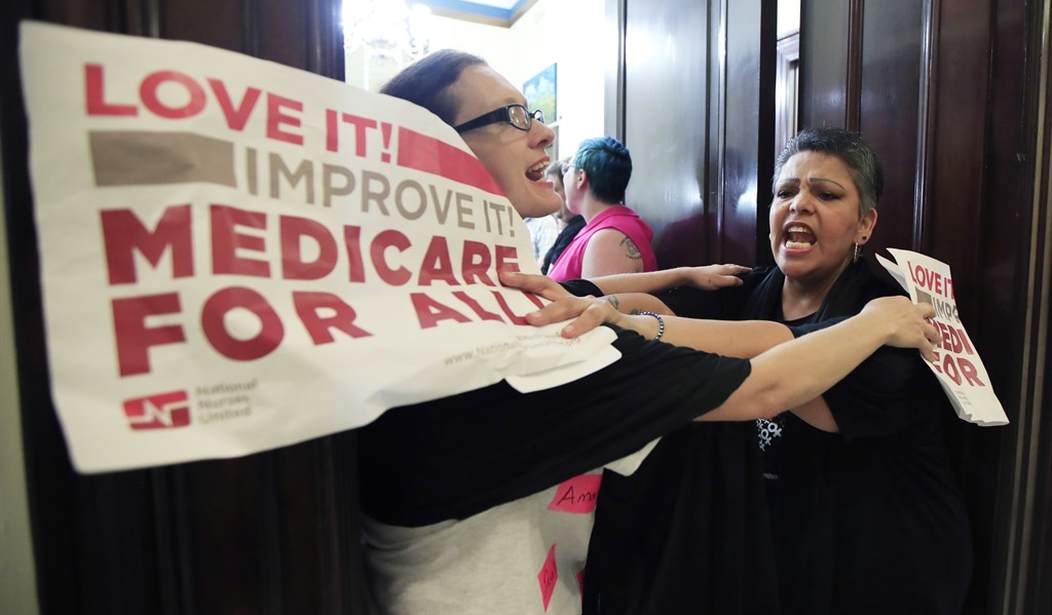The two parties will continue to battle over health-care policy for years to come but there’s no question which one holds the ideological high ground. The left’s victory on this subject is assured. The only mystery is how long it’ll take.
It’s tempting to conclude that ObamaCare has transformed popular opinion on the urgency of universal coverage. That may be true, but I wouldn’t bank on it.
A new poll suggests the country may be shifting left on this core issue, with 62 percent saying it’s the federal government’s responsibility to make sure that all Americans have health care coverage, while 37 percent say it is not…
As recently as March, the AP-NORC poll had found Americans more ambivalent about the federal government’s role, with a slim 52 percent majority saying health coverage is a federal responsibility, and 47 percent saying it is not…
The latest AP-NORC poll found a familiar partisan split: more than 8 in 10 Democrats said health care is a federal responsibility, compared with 3 in 10 Republicans. Political independents were more closely divided, with 54 percent saying coverage is a federal responsibility and 44 percent saying it is not.
That’s a big partisan gap, sure, but 30 percent of Republicans isn’t insignificant. And the AP’s poll isn’t the only one this year to show it. Back in January, three days before Trump was sworn in, Pew released its own poll gauging changes to public opinion on universal coverage as a key priority in health-care reform. Result: 32 percent of Republicans agreed that the feds have a responsibility to ensure coverage for all Americans, right in line with today’s result. (The topline number of 60 percent overall also closely matches the AP.)
As I say, though, it’s not clear if ObamaCare has shaped expectations over the last few years or if this has traditionally been a quiet expectation among Americans with a brief interruption recently due to a backlash to ObamaCare. Here’s Pew’s trendline dating back to 2000:

The share of Americans who viewed universal coverage as a federal responsibility was higher in Clinton’s final year in office than it is now, but that fact in isolation would be misleading. The number who feel that way tanked during the Obama years, only to come roaring back as Americans have gotten more comfortable with ObamaCare and grown more anxious about what GOP plan might replace it. The trendlines are back in the left’s favor. In fact, feast your eyes on the numbers when the AP asked people to estimate whether the Republican proposals are likely to make certain groups better off or worse off if they become law:

Better off/worse off for lower-income families: 18/59. Better off/worse off for Americans with serious illness: 16/64. Those are gruesome splits, and they’re not the only ones. The AP tested various component parts of the GOP plan and got similarly lopsided results. Americans oppose reducing federal funding for Medicaid by a 21/64 margin and oppose letting insurers charge some people higher premiums based on their medical history (a basic component of traditional insurance) by a 15/73 spread. Overall, 59 percent now favor keeping ObamaCare, up six points since January. You don’t need a weatherman to tell you which way the wind’s blowing.
Exit question via another health-care poll that dropped within the last few days: Why are a majority of Americans okay with charging smokers higher rates for insurance but not very obese people? Is it because there are more obese Americans than smokers now? Is it because smoking’s been a public health crisis for so much longer than obesity has, giving smokers ample notice of the risk they’ve assumed? Or is it because treating the chief health risk of smoking, cancer, is known to be extremely expensive?








Join the conversation as a VIP Member